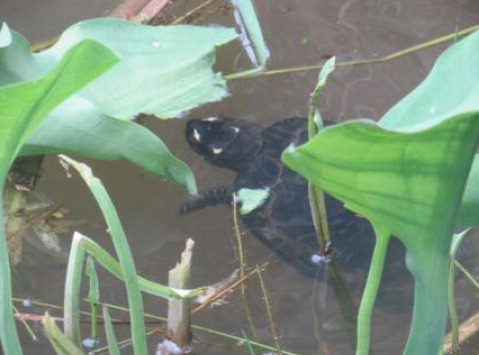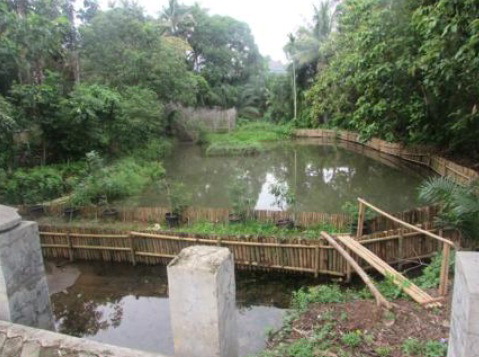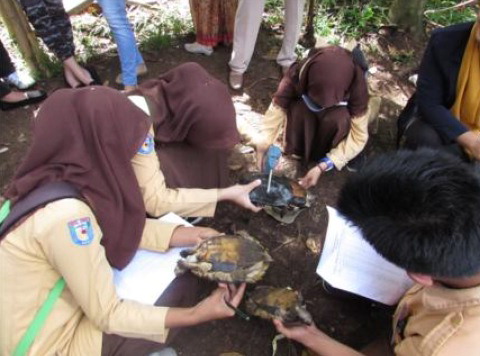|
Cycle 4 (2015 Deadline)
Developing science and learning research capacity of Bengkulu University in ex situ conservation of Sumatran freshwater and terrestrial turtles
PI: Aceng Ruyani (ruyani@unib.ac.id), Bengkulu University
U.S. Partner: Catherine Matthews, The University of North Carolina at Greensboro
Project Dates: December 2015 - January 2019
Project Overview
The project was featured on a the Trans7 TV program "Dunia Benatang - Kura Kura Sumatera (Animal World - Sumatran Turtles) in November 2016.
|
Science education at the K-12 levels in Bengkulu does not focus on biodiversity. Fieldwork is rarely included as an instructional technique at any educational level, and there is little focus on local conservation issues. Bengkulu University (Unib) recently started a graduate program for teachers with the theme of “Natural Conservation Education for A Better Life.” In conjunction with this graduate program, Unib has also started a pioneering conservation effort, "Unib Campus, A Safe Home for Turtles,” with educational components at the K-12 level and at the university as part of the Science Teacher Education curriculum track. Meanwhile the U.S. Government-supported partner from North Carolina has engaged equal numbers of high school students, girls and boys, with a focus on rural minority students, in summer residential programs that teach the students about herpetology by involving them in research on native species. Teachers are included as participants in the summer programs and graduate students are able to earn university credit by participating. The main goal of this PEER project is to develop both science and learning research capacity through cooperation between UNC Greensboro and Unib using the field of herpetology as a venue to improve conservation education and, indeed, conservation itself. Furthermore the cooperation is designed to achieve the following goals; (1) identify some safe habitats for five species of turtles, (2) increase science and learning research capacity through the thesis research of nine graduate students, (3) develop teaching modules, (4) develop both indoor and outdoor learning resources, and (5) establish a new teacher training center in herpetology and environmental education on the green campus of Unib.
This project will support the spirit of the program “Unib Campus, A Safe Home for Turtles,” which is a novelty for Indonesia. The existence of the turtles on the Unib campus will be a learning resource for conservation education for the young people in Bengkulu. This model of conservation efforts through educational approaches is designed to be completed over three years, as an attempt to improve the competence of biology teachers in Bengkulu and other provinces of Indonesia. This project will change some paradigms of science education so as to approach the criteria of “teaching green,” among others. It will foster a personal connection with nature, connections with other people and other species, and help participants move from awareness to knowledge to action. Furthermore, it will help move science education in Bengkulu from a very formal model to a more culturally appropriate effort for increasing young peoples’ knowledge, appreciation, attitudes, environmental awareness, and involvement in nature conservation in Bengkulu. There is a clear distinction between scientists and science teachers in Indonesian universities, with scientists focusing on pure biology (science) and science teachers focusing on learning biology (pedagogy). Some educational institutions in Indonesia still emphasize this dichotomy between content and learning, which has been noted as a classical problem in science education. This project will develop both science and learning research capacity to show that these two identities can co-exist in a single individual and that this can be very beneficial.
Final Summary of Project Activities The main goal of this research was to develop both science and learning research capacity using the field of herpetology as a venue to improve conservation education and, indeed, conservation itself. It was designed to achieve the following targets: (1) identify some safe habitats for three species of turtles; (2) increase science and learning research capacity through the thesis research of nine graduate and undergraduate students; (3) develop nine teaching modules; (4) develop five indoor and outdoor learning resources; and (5) establish nine new teacher training centers in herpetology and environmental education. During the period from December 2015 through January 2019, the PI and his team established three new ex situ conservation areas, bringing to five the total number of areas on campus for Cyclemys oldhamii, Cuora amboinensis, Siebenrockiella crassicollis, Heosemys spinosa, and Manouria emys. The living collections of the five species are also available at the Unib Turtle Learning Center to be used as a learning resource for turtle conservation. Over the course of the project, 20 undergraduate and graduate students participated in research about ex situ turtle conservation. The data they collected and experience gained were incorporated into the compilation of nine validated teaching modules, which the team implemented in the new teacher training center at Unib. The modules served a varied range of student groups from preschoolers through postgraduates, as well as professional teachers. This PEER project also resulted in the organization of three research workshops, 40 training sessions, and three seminars, involving a total of 1,870 participants (1,003 female and 867 male). Overall, the five output targets were all achieved according to plan. Although the team still faces some challenges and limitations regarding the ex situ conservation aspects of their work, they have applied the interim results they achieved (in terms of both data and research capacity) to enhance their baseline for future sustainable conservation efforts. The PI Dr. Ruyani believes that the Sumatran freshwater and terrestrial turtle study center will serve as a flagship unit at Unib. The government of Indonesia has provided around $35,000 in funding from 2018 through 2021, but the PI and his team continue to seek further support from national and international conservation institutions.  |  |  | | One of the turtles under observation. | An artificial turtle pond created by the project team. | Students learn conservation techniques and herpetology under Dr. Ruyani's direction (photo credit: Dr. Ruyani). |
Back to PEER Cycle 4 Grant Recipients
| 





